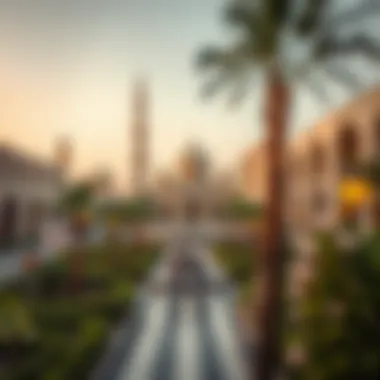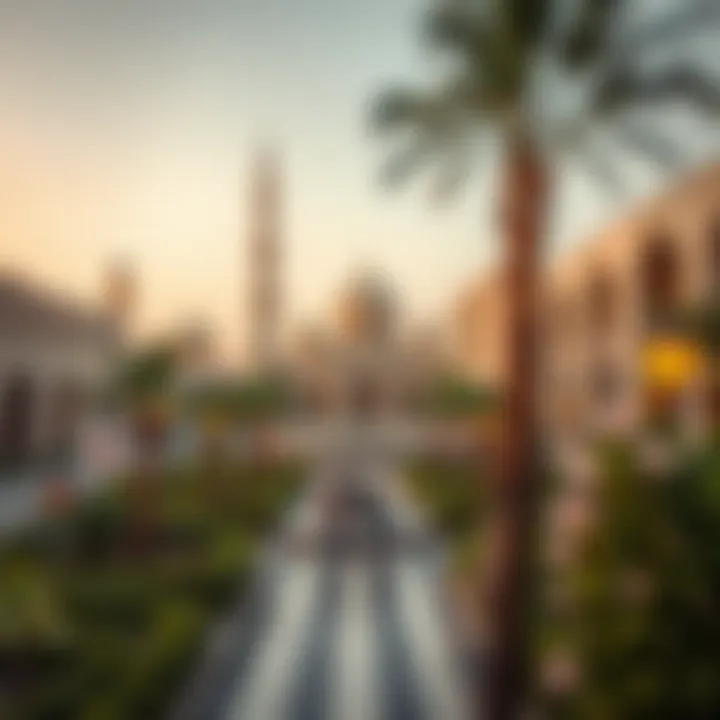Public Holidays in the UAE for 2023: A Detailed Overview


Intro
The United Arab Emirates (UAE) is a country that harmoniously blends tradition with modernity. At the heart of its vibrant society are the public holidays, which not only offer a breather from the daily grind but also serve as a reminder of the rich cultural and historical tapestry of the nation. The holidays in 2023 present a unique tapestry of significance, resonating with locals and expatriates alike. Understanding these holidays is crucial, especially for savvy investors and homebuyers looking to navigate the UAE's distinctive social landscape.
From the glimmering skyscrapers of Dubai to the cultural heritage of Abu Dhabi, public holidays mirror the aspirations and values of the UAE people. This guide delves into each holiday of 2023, exploring their origins, meaning, and how they shape various aspects of life, including travel, real estate, and local traditions. As a result, it is critical for both residents and investors to comprehend how these days affect market trends and community life.
Navigating the rhythm of the UAE's public holidays could be pivotal for anyone looking to establish roots or expand investments in the region. With this in mind, let's uncover the layers of significance tied to these days.
Understanding Public Holidays in the UAE
Public holidays in the UAE hold a unique place in both the cultural and economic fabric of the nation. They are not merely days off work; they signify deeper meanings that resonate with the community and reflect the rich tapestry of traditions here. Understanding these holidays can be beneficial in numerous ways, especially for those who are navigating life as either residents or investors.
Definition and Importance
Public holidays represent mandated days of rest recognized by the government. In the context of the UAE, these holidays are predominantly influenced by Islamic traditions, reflecting the nation’s cultural roots. The importance cannot be understated, as these observances provide citizens and residents alike with opportunities to celebrate, reflect, and spend quality time with family.
Moreover, from a practical standpoint, knowing when these holidays occur helps in planning work schedules, vacations, and business operations. For investors and entrepreneurs, understanding the public holiday calendar can drive strategic decisions regarding market engagement and timing for launching initiatives. As such, these dates are essential considerations when operating within the UAE's diverse environment.
Cultural Significance
The cultural significance of public holidays in the UAE extends far beyond days marked on a calendar. These occasions are steeped in history and traditions that can be traced back to the nation’s foundation and its deep Islamic roots. For instance, Eid Al-Fitr and Eid Al-Adha are celebrated with fervor, marking the end of Ramadan and the willingness to sacrifice, respectively. These holidays usher in a spirit of giving and community bonding, often characterized by family gatherings, festive meals, and charitable acts.
Further, certain holidays, such as UAE National Day, serve to reinforce national pride and unity. Citizens and residents come together for parades, performances, and cultural exhibitions, showcasing the rich heritage of the emirates.
In addition, holidays present a chance for expats to immerse themselves in local customs, offering a unique glimpse into Emirati culture. Learning about the significance behind these days fosters a more profound connection with the local community. As the world becomes increasingly globalized, understanding these nuances can enrich interactions and engagements for non-nationals, ultimately leading to a smoother integration.
"Comprehending the significance behind public holidays in the UAE is not just an exercise in cultural understanding; it is a gateway to more meaningful connections and successful engagements in all facets of life here."
In summary, recognizing the importance and cultural depth of public holidays is a foundational aspect for anyone living in or engaging with the UAE. As we delve deeper into various holidays in 2023, the nuances and implications of each date will unfold, painting a comprehensive picture of how these observances shape rhythms of life across the Emirates.
Official Public Holidays in the UAE for
Public holidays in the UAE serve as more than just days off from work; they reflect the unity and cultural heritage of this diverse nation. Knowing when these holidays fall is paramount for expatriates, tourists, and even local residents who navigate their daily lives around these observances. The calendar year 2023 offers several key holidays that are integral to understanding the social fabric here. Whether you’re a business owner planning your operations, or an expat seeking to participate meaningfully in local culture, being aware of these holidays can also influence your lifestyle and investments.
New Year's Day
Kicking off the year on January 1st, New Year’s Day in the UAE is marked by celebrations that bridge traditional and modern practices. While many people might think it's simply about staying up to welcome the New Year, here it is a moment to reflect and set intentions. Restaurants and hotels often offer lavish brunches, and fireworks light up the skies in major cities.
For those new to the UAE, note that business operations might slow down during this time as many people take extended breaks. It’s a good idea for companies to plan accordingly to keep productivity on track.
Eid Al-Fitr
Eid Al-Fitr, celebrated after the holy month of Ramadan, is a festive occasion marking the end of fasting. In 2023, Eid Al-Fitr is expected to fall around the last week of April, subject to lunar sightings. The spirit of generosity fills the air as families and friends come together. Traditions include the giving of Zakat (charitable donations) and sharing meals, often featuring traditional dishes like biryani and kunafa.
Expatriates can join these celebrations quite easily. Many understand the importance of participating in family gatherings and public events. Look for community festivities; they’re a splendid way to dive deep into the local culture.
Arafat Day
Arafat Day, which occurs just before Eid Al-Adha, holds significant religious importance. It’s primarily a day of prayer and reflection for Muslims around the world. In 2023, it occurs in late June. Widespread observance involves going to mosques and engaging in services. For many, it’s also the day of Hajj, where pilgrims gather at Mount Arafat in Saudi Arabia, marking a peak moment in their faith journey.
Even if you're not observing yourself, be mindful that many people will take this day off, affecting local business hours and public services.


Eid Al-Adha
Eid Al-Adha, also known as the 'Festival of Sacrifice,' falls soon after Arafat Day, around late June or early July in 2023. Much like Eid Al-Fitr, this holiday encompasses feasting and familial ties, but here the focus is on the act of sacrifice, commemorating the willingness of Ibrahim to sacrifice his son.
You'll see a lot of charitable acts and community engagement, with families often sharing the harvest of their sacrifices with neighbors, friends, and the less fortunate. For expats, this provides a meaningful opportunity to connect with locals, fostering a deeper understanding of Islamic customs and social responsibilities.
Islamic New Year
The Islamic New Year, marking the beginning of the lunar calendar, will arrive in 2023 in late July. Although it is not celebrated on the same scale as Eid festivities, many families reflect on the past year and make plans for the coming one. Activities might include quiet family gatherings and small prayers.
Businesses often remain open, but it’s good practice to recognize the day especially if you’re engaging with local colleagues or clients.
Prophet Muhammad’s Birthday
The observance of Prophet Muhammad’s Birthday, or Mawlid, takes place in late September 2023. This day centers around celebrating the life and teachings of the Prophet, often involving gathering at mosques, sharing stories, and highlighting acts of kindness.
For those residing in the UAE, understanding the significance of this birthday can help foster respect and engagement in conversations that revolve around faith and traditions.
UAE National Day
Closing the holiday calendar with a bang, UAE National Day is celebrated on December 2nd. It commemorates the union of the seven emirates, marking a moment of national pride. The celebrations include parades, fireworks, and various public events that showcase cultural heritage.
For new residents and expats, this is an excellent time to immerse yourself in the vibrancy of local customs and festivities. Streets are festooned with flags and lights, and participation in events could offer insights into the spirit of unity that defines this destination.
Knowing these public holidays isn’t just about time off; it shapes how one interacts with life in the UAE, influencing personal connections, business relationships, and cultural understanding.
With a grip on the public holidays, you can navigate work, family life, and community gatherings with greater ease.
Changes and Updates in Holiday Observances
Recognizing the importance of public holidays in the UAE, the landscape surrounding them is not static; it experiences its share of twists and turns. Changes and updates in holiday observances are paramount to understanding how the seasons of tradition align with the modern vibrancy of the region.
These updates can shape expectations not just for local residents but expats and tourists alike. They usher in opportunities for both leisure and business operations while reflecting the nation’s evolving cultural norms. By keeping abreast of these changes, stakeholders—from residents to investors—can better navigate the Emirate's socio-economic framework.
Recent Legislative Changes
In recent years, the UAE has seen several legislative changes regarding public holidays. These modifications serve various aims, including enhancing work-life balance and promoting tourism. For instance, the official declarations concerning Eid holidays now typically include more extended periods, providing a chance for families to gather and for communities to engage in collective festivities.
Moreover, there has been a notable shift to end gender discrimination in holiday privileges. For example, it is now customary for both men and women to enjoy paid leave on particular holidays, ensuring equality in observance. The changes also reflect a trend towards inclusivity, recognizing the diverse backgrounds and cultures present in the UAE.
"Public holidays are both a reflection of a nation's values and an opportunity to reinforce them."
Additionally, significant adjustments made to holiday timings have far-reaching effects. The transition from fixed dates to depending on lunar sightings means that important holidays like Eid may shift by a day, affecting travel plans and business schedules drastically.
Impact on the Working Sector
The influence of recent updates resonates deeply within the working sector. Companies must adapt their operational calendars to align with not only mandatory public holidays but also those of various nationalities working within the UAE. Employers are compelled to be agile regarding shifts in holiday observance; this includes potentially extended breaks or unexpected closures.
This adaptability holds substantial weight for multinational companies where differing practices might collide. Businesses need to be prepared for a rush of vacation applications surrounding holidays, leading to fluctuation in productivity levels. Consequently, effective communication channels become essential during such periods, keeping everyone informed and aligned.
Further, as more firms recognize the varied cultural tapestry that makes up their workforce, holiday observances can be a bridge to cultural appreciation and team cohesion. Workshops and seminars during significant holidays can forge stronger bonds between colleagues, fostering an environment of inclusivity.


Impact of Public Holidays on the Economy
Public holidays in the UAE hold tremendous significance not just from a cultural perspective but also for their economic implications. Understanding how these holidays shape the national economy offers key insights for homebuyers, investors, real estate agents, and expats looking to navigate the local landscape. The influence of holidays stretches beyond mere days off; they catalyze fluctuations in consumer behavior, investment strategies, and overall economic activity.
Business Operations
When it comes to business, public holidays can be a double-edged sword. On one hand, these days off create an opportunity for employees to rest and recharge, potentially leading to increased productivity once they return to work. However, for businesses, the closure of offices during holidays can result in reduced revenue, especially in sectors heavily reliant on consumer spending like retail and hospitality.
- Impact on Retail Sales: During holidays, many retailers boost their promotions and sales. For instance, Eid Al-Fitr often sees a spike in consumer spending, as families purchase gifts and festive items. Retailers prepare for this surge, affecting inventory levels and staffing.
- Service Industry Adjustments: For restaurants and hotels, holidays can lead to increased bookings or conversely, decline if they are closed for observance. The timing of holidays can dictate whether businesses thrive or struggle during specific periods.
- Public Sector Operations: Government services slow down during public holidays. This can impact transactions in real estate market, legal processes, and bureaucratic functions which rely on swift, uninterrupted service.
Understanding these elements helps a business prepare accordingly, ensuring they optimize opportunities and minimize disruptions during peak holiday seasons.
Tourism Industry Influence
The UAE's tourism sector showcases a fascinating interplay with public holidays. With the nation known for its rich cultural festivals, these holidays often draw both local and international visitors, boosting the overall tourism economy.
- Travel Trends: Holidays like UAE National Day attract many tourists who want to experience grand celebrations. Hotels see high occupancy rates, and attractions often fill to the brim. This surge highlights how important public holidays are as travel times for families, considering that many expats also choose to spend these times discovering the UAE's splendors.
- Cultural Festivals: Events like the Diwali celebrations or Eid bring people together and create unique experiences that often attract tourists. These not only enrich the local culture but also create substantial economic activity.
- Investment in Infrastructure: Increased tourist influx results in higher demand for services, prompting investments in public infrastructure, restaurants, and entertainment venues to accommodate visitors. This development can significantly uplift local economies, often translating to job creation as new businesses emerge to meet the growing demand.
"Public holidays are not just days off; they are pivotal in shaping economic tides, drawing investors and influencing local consumer habits."
Through understanding the significance of public holidays and their ripple effects on both business operations and the tourism sector, stakeholders can make informed decisions that align with the trends in the market.
Moreover, as the UAE continues to evolve, both sectors will need to adapt to the changing dynamics of holiday observance, ensuring their practices remain relevant to the cultural landscape.
Holiday Preparations in the UAE
The anticipation surrounding public holidays in the UAE brings a unique blend of excitement and preparation. With a diverse mix of cultures and traditions, the way holidays are celebrated varies widely, reflecting the rich tapestry of the UAE's social fabric. Understanding holiday preparations is essential, especially for expatriates and investors who wish to integrate more fully into this vibrant society. These preparations not only mark the occasion but also showcase the cultural identity and values of the nation.
Cultural Festivities
As holidays approach, cultural festivities take center stage, transforming the atmosphere into a lively blend of traditions. From dazzling fireworks on New Year's Eve to the serene tranquility of Eid prayers at dawn, each holiday fosters a sense of togetherness and celebration. Families often come together to enjoy meals that center around traditional dishes, signifying a time for sharing and bonding.
During Ramadan, for example, the festive spirit peaks with Iftar gatherings where friends, neighbors, and even strangers break fast together, reflecting hospitality that is deeply rooted in Emirati culture. In anticipation of Eid Al-Fitr, the streets are adorned with beautiful lights and decorations, capturing the joy of the occasion. Shops offer special discounts and promotions, enticing residents and tourists alike to partake in the celebrations.
Notably, cultural festivals like the UAE National Day in December allow for grand parades, showcasing folklore, music, and dance. This not only cements national pride but also serves as an invitation for residents, especially expats, to engage in the local culture.
Local Traditions and Customs
Delving deeper into local traditions and customs reveals a wealth of practices that accompany each holiday. For instance, during Eid Al-Adha, it is customary for families to engage in the ritual sacrifice, a practice filled with meaning and respect for the values of generosity. In preparation for such days, families often shop in advance for clothing and gifts, ensuring everyone can partake in the festivities.
Decorating homes is another prevalent activity. In the lead-up to significant holidays, homes are often beautifully adorned with lights, lanterns, and other festive decorations. This practice not only enhances the joy of the occasion but also conveys a sense of belonging and community spirit.
Moreover, public celebrations often feature traditional music and dance performances, reflecting the heritage of the UAE. These customs not only honor the past but also serve as a bridge, connecting generations and fostering a deeper understanding of the cultural context. The sense of unity in observing these traditions is palpable, making the experience enriching for everyone involved.
"Public holidays allow everyone, regardless of nationality, to partake in the vibrant cultural tapestry of the UAE, fostering greater understanding and respect among diverse communities."
For more information on the cultural significance and celebrations in the UAE, check out UAE Culture or visit The National.
Influence on Real Estate Trends
Public holidays in the UAE have far-reaching ramifications that ripple through various sectors, including real estate. The interplay between these holidays and property trends is worth examining, particularly for stakeholders like homebuyers, investors, agents, analysts, and even expatriates. During public holidays, the dynamics of the market can shift, influencing decisions and strategies in property investments.


Long Term Impact on Property Investments
Every holiday tells a story. They contribute to shaping consumer expectations and market sentiment. For example, consider Eid Al-Fitr; it's a time when families flock back to the UAE after spending time abroad. This surge often signals an uptick in demand for residential properties. Investors may notice that homes in popular locales become hotter commodities post-Eid as families aim to settle before schools and work resume.
Moreover, cities like Dubai and Abu Dhabi showcase unique characteristics during the holiday seasons. The festive atmosphere tends to enhance the attractiveness of certain neighborhoods, leading to an increase in property values. Investors keeping a keen eye on these trends are more likely to make informed decisions that align with long-term growth expectations.
Additionally, corporate entities often adjust schedules around holidays, creating both challenges and opportunities in leasing and sales. Properties situated in areas that host major events during holidays may see sustained demand, reinforcing their long-term investment potential.
Short-Term Opportunities in the Market
When it comes to short-term market opportunities, public holidays can serve as a double-edged sword. They can trigger immediate sales spikes or drive sluggishness depending on the property type and market behavior. For instance, a spike in tourist visitors during holidays can lead to increased interest in short-term rentals. Investors may find that properties in prime locations experience higher occupancy rates, enhancing cash flows.
However, it’s essential to also consider potential pitfalls. While some properties might flourish, others could see a decrease in activity, especially those away from popular holiday routes or activities. Investors might want to prioritize properties in locales that see substantial holiday foot traffic.
"Real estate is not just about property; it's about timing, emotions, and experiences. Holidays can magnify these elements significantly."
In brief, the trends surrounding public holidays present a landscape filled with opportunities. Whether one is looking at long-term investments or immediate revenue potential from short-term rentals, understanding how holidays impact the real estate market is key.
Expats and Public Holidays
Understanding the role of public holidays in the UAE is critical for expats who might be new to the country. These holidays not only mark significant cultural and historical events but also present an opportunity for expats to deepen their connection with the local community. Learning about public holidays helps newcomers blend in and participate in regional traditions while enjoying the diverse multicultural landscape.
Integration into Local Culture
Public holidays in the UAE serve as gateways for expats to immerse themselves in the rich local culture. Every holiday, whether religious or national, comes with its own customs and rituals. For example, during Eid Al-Fitr, many locals decorate their homes, prepare special meals, and exchange gifts. Expats can benefit from joining in these activities to foster friendships and build a sense of belonging. Understanding the cultural significance—like the observance of Ramadan and how it influences daily life—can also open doors for better relationships with local colleagues and neighbors.
Additionally, participation in traditional festivities creates shared experiences. Engaging in community events or volunteer activities during holidays provides insights that wouldn’t come from casual observation alone. It’s a chance for expats to celebrate alongside their Emirati counterparts, bridging cultural divides and enriching their stay. Missteps in cultural etiquette can be minimized by educating oneself about specific practices. This makes respect and appreciation flourish and adds a valuable layer to the expat experience.
Observing Holidays as an Expat
Observing public holidays as an expatriate can be both enlightening and enjoyable. While many offices close during these times, expats might find themselves with a rare opportunity for exploration. Many people take advantage of these holidays to travel within the UAE or visit neighboring countries. The unique timing of public holidays also allows for participation in remarkable events such as fireworks displays on the UAE National Day or the solemn beauty of prayers during the Eid celebrations.
It's crucial for expats to engage actively on these days. They might organize small gatherings or join in community activities. Such initiatives create a sense of camaraderie among other expatriates and locals alike. Understanding how to navigate public transportation during holidays, which can be crowded, or knowing that some shops may close early, ensures a smoother experience.
Furthermore, many expats have found that using these holidays as an opportunity to share their own cultural celebrations can enhance local understanding of diversity. These personal touches create a beautiful tapestry of experiences and bring communities closer together.
"In a land of many cultures, public holidays can turn into bridges, where everyone is invited, and every story matters."
By gaining insight into the nuances of celebrating holidays in the UAE, expats don’t just observe but actively participate in a living culture, enhancing both their own experiences and those of their local friends.
Closure and Looking Ahead
Understanding public holidays in the UAE is not just about recognizing days off work; it's about grasping the intricate weave of culture, economy, and social dynamics that these holidays represent. The nuances of these significant dates can significantly shape both the lives of residents and the strategies of business operations.
As we reflect on 2023, it's clear that public holidays served as a marker for both celebration and contemplation for many in the UAE. From Eid festivities to National Day parades, each holiday carries its own weight of expectations and meanings. Moreover, with a plethora of expats residing in the country, these holidays have created unique blends of cultural traditions. Understanding these traditions can key to fostering better relations both personally and professionally, enriching the social fabric of this vibrant nation.
Reflections on
The year offered a mosaic of experiences shaped by the holidays observed. Those significant dates were not merely calendar entries; they were periods for gathering, reflection, and enjoyment. Public holidays instilled a sense of community among families and friends, regardless of their backgrounds. For instance, during Eid Al-Fitr, many enjoyed communal meals, shared gifts, and embraced traditions unique to their cultures, while simultaneously respecting local customs.
Economically, the public holidays had ripple effects. Retailers saw spikes in consumer spending during holiday sales, and hospitality sectors flourished as families vacationed and tourists flocked to the UAE. This year also underscored the need for businesses to remain aware of these patterns, as adapting to holiday schedules and social events can lead to more effective engagement strategies.
Future Trends in Holiday Observance
Looking ahead, the trends surrounding holiday observance in the UAE are poised to evolve. As the country continually diversifies its demographic makeup, the blend of traditions will likely give rise to new celebrations and customs. The emergence of more inclusive observances is a possibility as expat communities seek ways to integrate their own cultural festivals into the local calendar, facilitating richer cross-cultural exchanges and stronger community bonds.
Furthermore, continuing technological advancements may shape how these holidays are celebrated. Social media, for instance, is already playing a pivotal role in mesmerizing traditions, allowing people to share their experiences instantly. Businesses might leverage this to enhance their marketing strategies around holidays, offering personalized and immersive shopping experiences.







